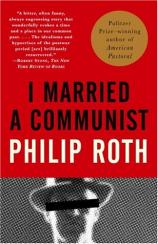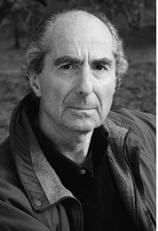Reading Group Guide
Discussion Questions
I Married a Communist

1. As Nathan's high school English teacher, Murray Ringold tells him that "In human society, thinking's the greatest transgression of all" [p. 2]. Do the events of his life, and his brother's, bear out this opinion?
2. Murray describes Ira's private life as "a grave misfortune replete with farce" [p. 3]. Would this describe his public life as well? Which aspects of his public life were tragic, which merely farcical? How are Ira's private and public lives inextricably linked? What about Eve's? How does Roth link private betrayal with the public variety?
3. Ira becomes famous by impersonating Abraham Lincoln; he dies, eventually, from the same rare disease Lincoln suffered from. Why does Roth stress similarities and parallels between Ira and Lincoln? What things does he imply about Ira by making the comparison? Does Ira have any justification in likening himself to American revolutionaries like Lincoln, Paine and Jefferson?
4. The young Nathan, enthusiastic about the Progressive Party, sees his father as someone who has made fatal compromises, and Ira as uncompromising. What compromises has Ira, in fact, made? Does the author imply that compromise is inevitable, even good and necessary? If so, do you agree with him?
5. Nathan is attracted by Ira's early orphaning, by his social and familial unrootedness, largely because he himself is so very rooted in his own family and culture. What effect does a father, or the lack of a father, have on a young man's life? What purpose do surrogate fathers serve? Is Nathan correct to define manhood as "the orphanhood that is total" [p. 217]?
6. "As a Communist," says Murray, "[Ira] should be irritated by her from the first second. So what explains this marriage with her and not with a comrade?" [p. 82]. What does explain it? Does the fact that Ira sees Eve as a "challenge" [p. 83] provide reason enough, or is the situation more complex than that?
7. Is Sylphid presented as a villain, or as someone to be pitied? How much sympathy do you have for her? How much sympathy do Nathan and Murray have for her? Who is most to blame in the self-destructive mother-daughter relationship, Eve or Sylphid, and how has Eve contributed to making Sylphid what she is? In what ways are mother and daughter similar?
8. Ira presents himself as a searingly honest man, and seems actually to believe that this is so. Yet he consistently lies about the two vital facts of his life: that he is a Communist, and that he is a murderer. Does your knowledge of these lies imply, to you, that he is dishonest about other things? That he is in fact dishonest by nature?
9. Several characters give blistering summaries of Ira as they perceive him. Katrina van Tassel calls him "an ignorant man, and a na•ve man, and a rude man, a bullying, simple-minded, arrogant man" [p. 149]; his former friend Goldstine says "Mankind at its stupidest doesn't come any stupiderÉ.I've always been scared of you. You're a wild man" [p. 97]; Johnny O'Day says "He wasn't a revolutionary, he wasn't a Lincoln, he wasn't anything. He wasn't a man" [p. 288]. Are these characterizations correct? Or are they too ruthless in their assessments? What valuable qualities does Ira possess, if any? Is he in fact, as Murray believes, "by and large," "virtuous" [p. 181]?
10. How did Ira's childhood experiences turn him toward violence and murder? How, afterward, did his murder of Strollo shape the rest of his life? Murray says that Ira's "whole life had been looking for a way not to kill somebody" [p. 292]. Into what other arenas does Ira deflect his violent impulses? At what times is his violent nature most in evidence?
11. Do you agree with Nathan that both Ira and Murray are "historical casualties" [p. 318]? What does he mean by that term? How might their lives have unfolded if they had lived in more peaceful times?
12. "I believe I have made the least harmful choice," Nathan says about his chosen way of life [p. 71]. Harmful to what, and to whom? Are there any clues in I Married a Communist, or in Roth's other novels, to indicate why Nathan lives in such a monastic fashion?
13. Iron Rinn/Ira Ringold was the teenaged Nathan's hero. What does this imply about our youthful ideas of heroes? Who, if anyone, might be the real hero of this story? Of the historical era?
14. If you have read American Pastoral, the novel that preceded I Married a Communist, how would you compare the two "heroes," Swede Levov and Ira Ringold? Are the two men similar, and if so, in what ways? How innocent is each of them, and how guilty? To what degree are both utopianists, and how realistic are their utopias?
15. What does I Married a Communist tell us about ourselves as Americans: about specifically American mores, values, fantasies, and character? In what ways were HUAC and the MacCarthy crisis characteristically American phenomena, possible only in this country?
I Married a Communist
- Publication Date: November 2, 1999
- Genres: Fiction, Literary Fiction
- Paperback: 336 pages
- Publisher: Vintage
- ISBN-10: 0375707212
- ISBN-13: 9780375707216








